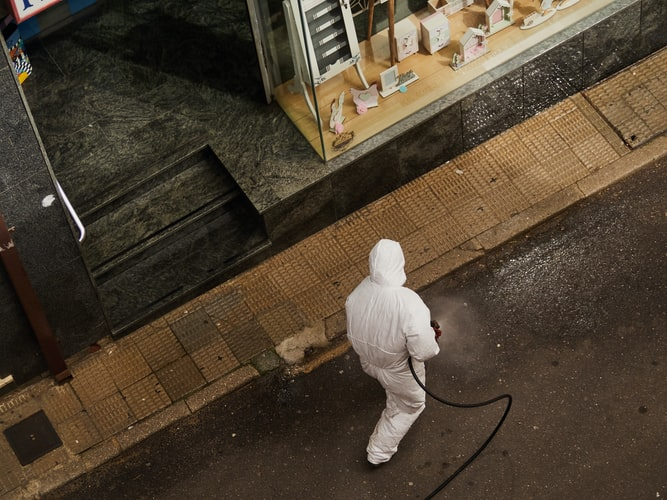Stay Inside, Stay Inspired #3 The COVID 19 pandemic that is sweeping across the globe imposes complex decision-making, particularly in terms of health. Certain choices, notably containment, must be respected by all citizens in order to bring the pandemic to an end. However, quick decisions by some cities could be doing more harm to the environment than good. The disinfection of streets and public places with chemical sprays has not yet proved its effectiveness in the fight against COVID 19, while its harmful effects on the environment are certain.
Bleach kills the virus… and anything else that crosses its path.
From a health perspective, bleach is highly irritating and corrosive. Bleach, as well as other strong disinfectants, contains large quantities of alcohol and can have harmful effects on the lungs and organs when inhaled.
From an environmental point of view, bleach is a toxic and, above all, biocidal product. It destroys everything in its path. It kills bad bacteria, but also good bacteria that supports biodiversity, flora, and fauna.
While the use of such products may have a reassuring effect on populations, currently no health authority supports the practice. None of them recommend preventive or curative spraying sessions of city centers, or public infrastructure like park benches and other surfaces.
Disinfection impacting the quality of aquatic environments and biodiversity
When released into the environment, bleach releases chlorine that reacts with organic matter in soil, water, and air to form organochlorine compounds. These compounds are highly toxic to wildlife. Carcinogenic and mutagenic, they accumulate in the food chain and eventually impact humans. Once sprayed, sanitizing solutions enter the water cycle through the sewer system in the form of runoff. Not all water passes through a treatment facility before entering the natural environment. Thus, the products used can end up in rivers and the sea. Additionally, the disinfection products can also infiltrate the soil, having far-reaching impacts on land, plants, and animals. Finally, it is important to specify that the purification process used by most water treatment plants is achieved by bacterial actions. The introduction of chemicals in high concentrations (such as bleach or nitrates) can have a significant impact on the proper functioning of the treatment system.
Recommendations of Surfrider Europe
Surfrider Europe supports the safety recommendations of FNE (France Nature Environnement) Midi-Pyrénées. The priority right now is to keep populations safe, and limit the spread of the virus. Covering cities in toxic chemicals must not be the only way to achieve this goal. Mass disinfection practices should be stopped to protect human and environmental health and new alternative solutions should be conceptualized.
Chemical pollution of water is therefore a fact to be taken into account even in a crisis context such as that of COVID19. Disinfection alternatives with health and environmental benefits must be found. For more information, Surfrider Europe offers courses on Ocean Campus to better understand the theme of Water Quality and User Health, as well as DIY tutorials to sanitize your home with natural products.

